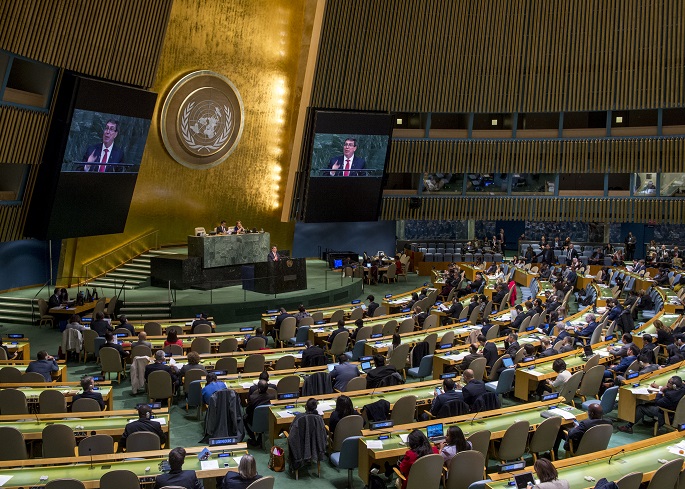U.S. votes against UN draft resolution on Cuba embargo
Published : 02 Nov 2017, 02:13

The United States on Wednesday voted against a UN General Assembly draft resolution that calls for the lifting of the U.S. economic and trade embargo on Cuba.
The draft resolution was approved 191-2, with the United States and Israel being the only countries that voted against it.
In a hawkish speech to the General Assembly prior to the vote, U.S. Ambassador to the United Nations Nikki Haley blamed Havana for the embargo.
"For the 25th time in 26 years, the United States will vote against this resolution," Haley told the assembly.
She accused Havana of using the General Assembly vote every year "as a shiny object to distract the world's attention from the destruction it has inflicted on its own people and on others in the Western Hemisphere."
"As long as the Cuban people continue to be deprived of their human rights and fundamental freedoms, as long as the proceeds from trade with Cuba go to prop up the dictatorial regime responsible for denying those rights, the United States does not fear isolation in this chamber (of the General Assembly) or anywhere else."
Haley said the General Assembly has no power to end the decades-old embargo. It is based in U.S. law, which only the U.S. Congress can change, she said. Haley scorned the General Assembly vote as "political theater" and a waste of time.
Cuban Foreign Minister Bruno Rodriguez Parrilla fought back, saying the U.S. blockade is "a flagrant, massive and systematic violation of the human rights of all Cubans" and qualifies as "an act of genocide."
"The human damage caused by the implementation of this policy are incalculable. There is not a single Cuban family or social service that has not suffered the deprivations and consequences resulting from the blockade," he told the assembly prior to the vote.
When explaining the "no" vote after the adoption of the resolution, Haley's deputy said that the Cuban government is to blame for the country's economic failure.
"Even if the U.S. Congress lifted the embargo today, Cubans would not be able to realize their potential without significant political, economic, and social reforms by their own government," said Michele Sison. "This resolution is a distraction from the real problems facing the Cuban people. Therefore, the United States strongly opposes it."
The United States abstained last year in a similar vote at the General Assembly. Haley explained that the about-face is because the election of Donald Trump as new president and herself as new UN ambassador.
"To those who are confused as to where the United States stands, let me be clear: as is their right under our constitution, the American people have spoken. They have chosen a new president, and he has chosen a new ambassador to the United Nations."
The Group of 77 (G77) of developing countries regretted the new policy of Trump aimed at strengthening the embargo against Cuba.
"The group believes this is a setback in the process of achieving normalized relations between the two countries," said Diego Morejon Pazmino, the Ecuadorian ambassador to the United Nations, on behalf of the G77 and China.
The G77 and China expressed their deep concern about the prolonged negative effects that the economic sanctions and travel restrictions have had on Cuba and its people.
From April 2016 to June this year, the impact of the U.S. embargo on Cuba's foreign trade amounts to more than 4 billion U.S. dollars. Limited foreign investment and difficult access to development credits translate directly into economic hardship and humanitarian impacts for the people of Cuba, the Ecuadorian ambassador told the General Assembly.
If these economic sanctions continue, Cuba's development potential will be unfairly undermined and it would be impossible for Cuba to successfully embark on the path toward sustainable development, he warned.
China regretted that previous General Assembly resolutions on the issue were not implemented. The blockade violates the purpose and principles of the UN Charter and causes enormous economic losses to Cuba, said Wu Haitao, the charge d'affaires of the Chinese mission to the United Nations.
"China has always advocated respect for a country to independently choose its own system and path of development, and opposed unilateral sanctions against other states by military, political, economic and other means," Wu told the assembly prior to the vote.
The world is undergoing transformation and peace and win-win cooperation have become a trend, he said. Exchanges and cooperation on equal footing among countries are part of this trend; dialogue on equal footing and friendly consultations represent the best way to resolve differences, he said.
He asked the United States and Cuba to continue the path of normalization of relations, which, he said, is in the interests of both countries. He asked the United States to lift its embargo on Cuba.

